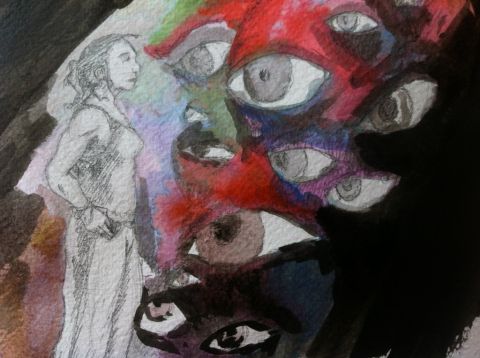Howard Hardiman responds to That Day, by Donna Williams.
I’ll admit I struggled with this for a number of reasons. First there was the wall of performance anxiety that I get with commissions. In particular, being asked to respond to someone else’s creativity, where if I produced something they wouldn’t like or recognise as connected to their own work, I’d feel like I was failing, even if I’d produced an image I was happy with.
Secondly, the poem was more polemic and clear in its intentions than most poetry so the instinct was to directly illustrate the content, but this didn’t seem satisfactory – as if I were creating a still for a film, rather than a poster, so you’d only understand one element, one moment and one angle on something that flows in a less concrete way.
Reading an interview with Donna, something stood out. She described the poem as a response to the ignorant attitudes people have about Deaf people, and the difficult relationship with disability when people think you “don’t look disabled”.
I think that’s what I’ve run with. In the image a pencil-drawn figure walks proudly through a world of colour, surrounded by a chaotic storm of glaring and disapproving eyes. By her hip, she’s subtly giving the finger.
I didn’t want to focus on the text too closely and make this about why Disability Living Allowance is justified because mainstream culture devalues Deaf people. It’s more the underlying themes that I wanted to pick up on, so I wasn’t making a carbon copy of the text in picture form.
It struck me that sticking to your guns, defiance and shoring yourself against a sea of ignorance were at the core of the poem; and the judgement that disabled people encounter (she exists in a world devoid of the colour that fills theirs).
I think with every piece you make, there’s an element of talking about yourself, and I can relate to the scrutiny Donna’s describing. It used to be that when I was having a seizure and desperately needed to collapse into a seat on the bus, people would glare at me for sitting in the priority seat. Now that my back injury means I need that seat, I’m the one leaning pointedly on the stick and hoping someone gets the hint. People look and say “You’re a bit young for walking with a stick” or there’s a peculiar nod of acknowledgement when I pass another person walking with a stick, that’s something like the moment of acknowledgement that passes between queers on the street :“You’re okay, it’s not just you.”
Over the last few months, I’ve had to stand in my underpants in therapy wards while someone watches me move to one side or the other until pain makes me yelp and stop. I’ve had to talk about my bladder and bowels more than I’ve ever had to in my life, and with more people. Over the last few years, I’ve been in scanners to look for what’s wrong with my brain, x-rays to tell me how bad my arm is, scans and scrutiny that leads to judgement and diagnosis. I’ve had to hurt my hands filling out 40-page forms detailing every thing I can’t do to validate the judgement that I’ve got impairments, I’ve had to sit with countless doctors and recount a narrative of my weakness and inability to walk, to use my hands, to concentrate, to remain conscious.
Against that constant, scrutinising glare, it’s hard sometimes to remember that there are many things I can do and areas where I am strong, but I keep doing that, challenging that narrative of failure and inability with the fact I’m fortunate enough to have a similar litany of good things I’ve done, can do, or have experienced, so to think of myself as useless would only be a still from the film, rather than the poster of it.
That day, I’ll wake without pain.
That day, I’ll lift without fear.
That day, I’ll work without distraction.
That day, I’ll think without fear of loss of consciousness.
That day, I’ll be without the weight of grief and doubt.
That day, you’ll see me as I do.
